-
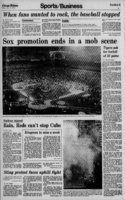 Disco Demolition Night at Comiskey Park, Chicago Tribune
Disco Demolition Night at Comiskey Park, Chicago Tribune From the July 13, 1979 issue of the Chicago Tribune.
The anti-disco promotion was spearheaded by White Sox owner Bill Veeck along with shock jock Steve Dahl of 97.9 FM WLUP "The Loop," a Chicago rock station. Attendees were able to attend the games for only 98 cents if they turned in a disco record; between the doubleheader’s games, all the donated records would be blown up in center field. The White Sox were forced to forfeit the second game when the promotion went off the rails, when anti-disco demonstrators rioted on the field and caused significant damage to the park. The riot resulted in at least nine injuries and 39 arrests.
-
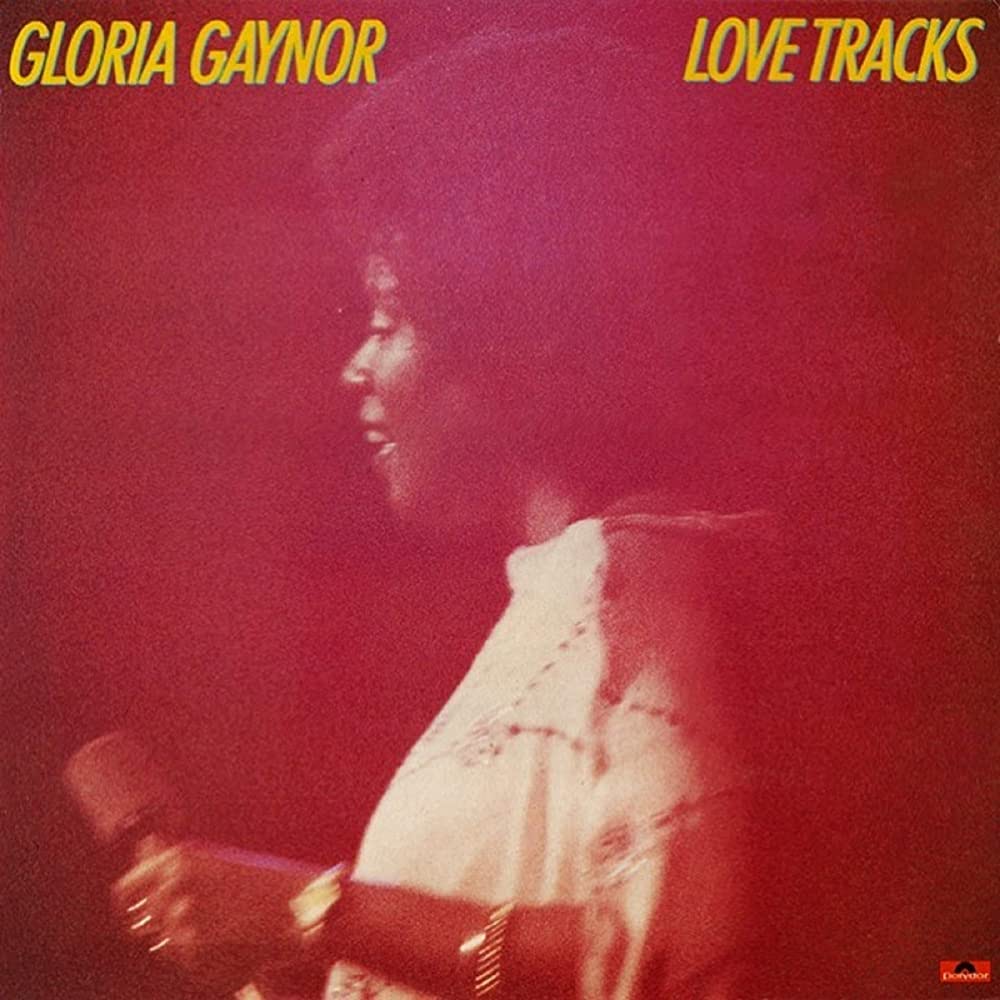 I Will Survive
I Will Survive "I Will Survive" resonated among the communities most closely tied to disco as a manifestation of liberation.
-
 Studio 54 with Balloons
Studio 54 with Balloons
-
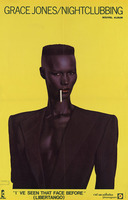 Grace Jones Poster
Grace Jones Poster Singer-performer Grace Jones firmly established her signature androgynous look with this iconic image advertising her 1981 Nightclubbing album and subsequent concerts. With her taut, slim body, gleaming dark skin, square-cut hair, and broad-shouldered masculine jacket with the plunging neckline, Jones satirized gender and racial stereotypes with a fashion-conscious theatricality that became part of her performance. Jones had been a successful model in Paris and then part of Andy Warhol's circle and the disco dance scene of New York. Her cross-dressing, use of the body, and sexualized performance all echo the complex exploitation and subversion of stereotypes by African American performer Josephine Baker in 1920s Paris. Jones's sleek, trend-setting look echoes the African-inspired geometric stylization of Baker's day, as well as the minimalist aesthetic of her own.
-
 33c Disco Music postage stamp
33c Disco Music postage stamp The Celebrate The Century: 1970s souvenir sheet was issued on November 18, 1999, in New York, New York.
The fifteen commemorative stamps on this sheet are titled: Earth Day Celebrated; All In The Family TV Series; "Sesame Street"; Disco Music; Steelers Win Four Super Bowls; US Celebrates 200th Birthday; Secretariat Wins Triple Crown; VCRs Transform Entertainment; "Pioneer 10"; Women's Rights Movement; 1970s Fashion; "Monday Night Football"; America Smiles; Jumbo Jets; and Medical Imaging.
-
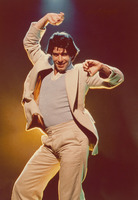 John Travolta
John Travolta John Travolta photographed for Time Magazine to promote Saturday Night Fever.
-
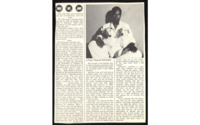 Sylvester Gnus article, 1977
Sylvester Gnus article, 1977 1977 Gnus article about Sylvester
-
 Disco Duck symphony
Disco Duck symphony From the Afrika Bambaataa Vinyl Collection
"Disco Duck" is a satirical disco novelty song performed by Rick Dees and His Cast of Idiots. "Disco Duck" made an appearance in the film Saturday Night Fever, in a dance club scene in which a group of senior citizens were learning to dance disco-style.
-
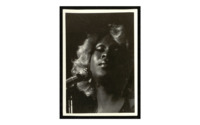 Sylvester performing
Sylvester performing Sylvester James Jr., known mononymously as Sylvester, was an American singer-songwriter. Primarily active in the genres of disco, rhythm and blues, and soul, he was known for his flamboyant and androgynous appearance and falsetto singing voice.
-
 Photographic slide of Marsha P. Johnson at a New York Gay Pride March
Photographic slide of Marsha P. Johnson at a New York Gay Pride March A color photographic slide depicting activist Marsha P. Johnson within the crowd at a New York Gay Pride March. Johnson is pictured at the center of the image, from the shoulders up. She has a short, curly hair style, wears rhinestone earrings and matching necklace, and a black sequined top with white and gold beaded collar. She is gazing straight ahead. Behind her are other participants at the march, including Bill Rafford, at the right. The film is housed in a white cardboard slide. At the bottom right corner, in black ink, is stamped [OCT 82W4]. On the obverse, at the top in blue is printed [Ektachrome SLIDE] with the Kodak logo and [PROCESSED BY KODAK] in red.
-
 Soul Makossa
Soul Makossa Soul Makossa is a song by Cameroon saxophonist and songwriter Manu Dibango. In 1972, David Mancuso found a copy in a Brooklyn West Indian record store and often played it at his parties at The Loft.
-
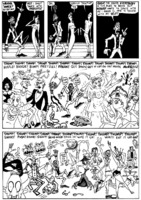 Anti-disco cartoon from Punk Magazine, 1979
Anti-disco cartoon from Punk Magazine, 1979 The 1970s saw a remasculization of America. Heterosexual men attack disco because they believed the culture limited their ability ot interact with women.
-
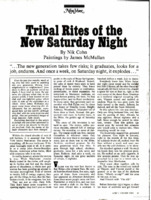 Tribal Rites of the New Saturday Night
Tribal Rites of the New Saturday Night "Tribal Rites of the New Saturday Night" is the title of a 1976 New York Magazine article by British rock journalist Nik Cohn, which formed the basis for the plot and inspired the characters for the 1977 movie Saturday Night Fever. Originally, the article was published as a piece of factual reporting.
-
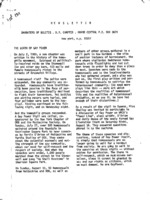 Newsletter Daughters of Bilitis/New York Sept 1969
Newsletter Daughters of Bilitis/New York Sept 1969 The Daughters of Bilitis call the Stonewall Inn Riots "the birth of gay power".
-
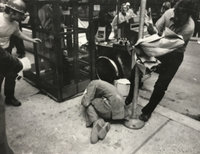 Workers stomping on a man on Broadway, May 8, 1970
Workers stomping on a man on Broadway, May 8, 1970 Construction workers violently protest storm a student protest against the Vietnam War in front of Federal Hall and under the statue of George Washington. Known as the Hard Hat Riots, it sparked two weeks of protests, counter-protests and marches.
-
 Time Magazine: Middle Americans as 1970 Man/Woman of the Year Cover
Time Magazine: Middle Americans as 1970 Man/Woman of the Year Cover Time announces Middle Americans as Man and Woman of the Year 1970
-
 David Mancuso
David Mancuso David Mancuso held the first "Love Saves the Day" party on February 14, 1970.
-
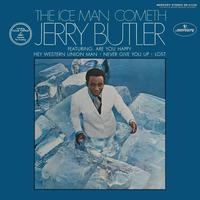 The Ice Man Cometh
The Ice Man Cometh Album by Jerry Butler containing "Only the Strong Will Survive".
-
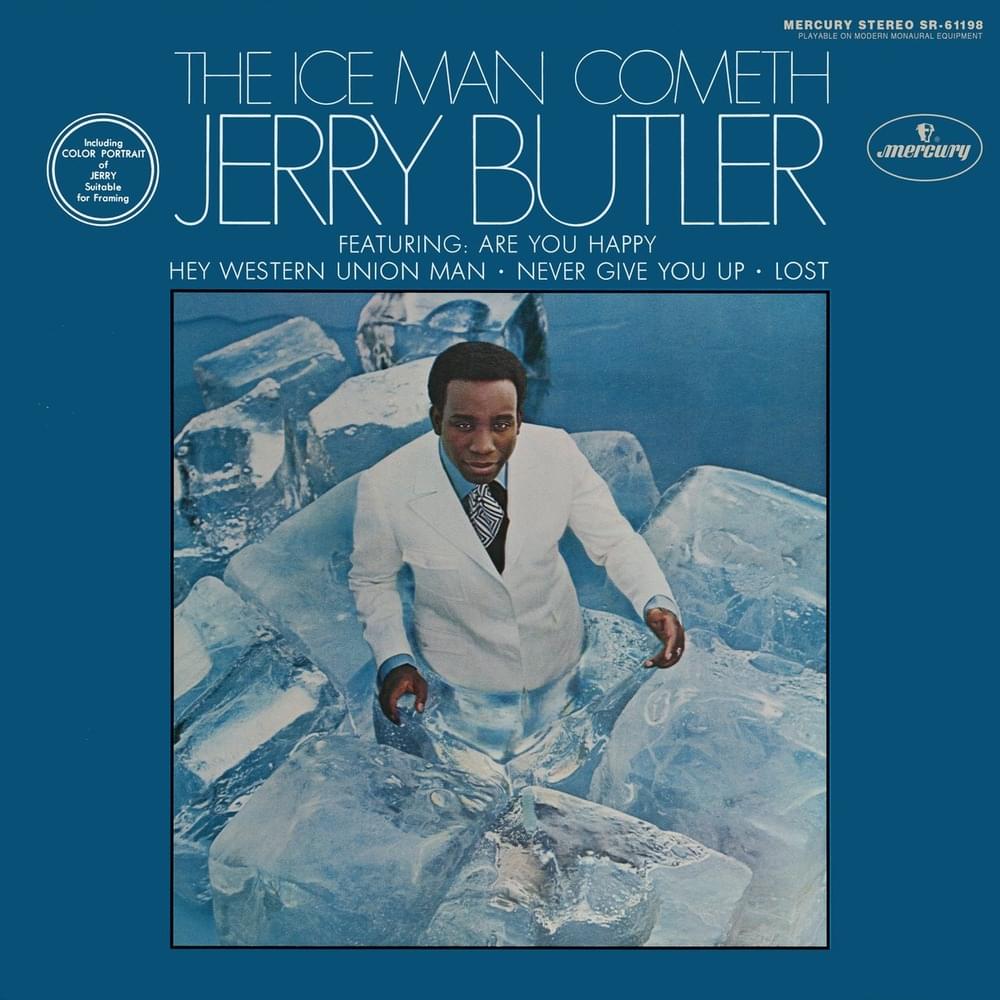 Only the Strong Survive
Only the Strong Survive "Only the Strong Survive" is a song written by Jerry Butler, Kenny Gamble and Leon Huff and originally sung in 1968 by Jerry Butler, released on his album The Ice Man Cometh. The most successful single of his career, it reached #4 on the Billboard Hot 100 and #1 for two weeks on the Billboard Black Singles Chart, in March and April 1969, respectively.
-
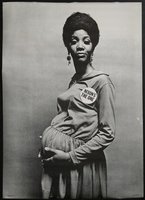 Nixon's the One
Nixon's the One An anti-Nixon poster criticizing Nixon's Southern Strategy and parodying Richard Nixon's campaign slogan.
 Disco Demolition Night at Comiskey Park, Chicago Tribune From the July 13, 1979 issue of the Chicago Tribune. The anti-disco promotion was spearheaded by White Sox owner Bill Veeck along with shock jock Steve Dahl of 97.9 FM WLUP "The Loop," a Chicago rock station. Attendees were able to attend the games for only 98 cents if they turned in a disco record; between the doubleheader’s games, all the donated records would be blown up in center field. The White Sox were forced to forfeit the second game when the promotion went off the rails, when anti-disco demonstrators rioted on the field and caused significant damage to the park. The riot resulted in at least nine injuries and 39 arrests.
Disco Demolition Night at Comiskey Park, Chicago Tribune From the July 13, 1979 issue of the Chicago Tribune. The anti-disco promotion was spearheaded by White Sox owner Bill Veeck along with shock jock Steve Dahl of 97.9 FM WLUP "The Loop," a Chicago rock station. Attendees were able to attend the games for only 98 cents if they turned in a disco record; between the doubleheader’s games, all the donated records would be blown up in center field. The White Sox were forced to forfeit the second game when the promotion went off the rails, when anti-disco demonstrators rioted on the field and caused significant damage to the park. The riot resulted in at least nine injuries and 39 arrests. I Will Survive "I Will Survive" resonated among the communities most closely tied to disco as a manifestation of liberation.
I Will Survive "I Will Survive" resonated among the communities most closely tied to disco as a manifestation of liberation. Studio 54 with Balloons
Studio 54 with Balloons
 Grace Jones Poster Singer-performer Grace Jones firmly established her signature androgynous look with this iconic image advertising her 1981 Nightclubbing album and subsequent concerts. With her taut, slim body, gleaming dark skin, square-cut hair, and broad-shouldered masculine jacket with the plunging neckline, Jones satirized gender and racial stereotypes with a fashion-conscious theatricality that became part of her performance. Jones had been a successful model in Paris and then part of Andy Warhol's circle and the disco dance scene of New York. Her cross-dressing, use of the body, and sexualized performance all echo the complex exploitation and subversion of stereotypes by African American performer Josephine Baker in 1920s Paris. Jones's sleek, trend-setting look echoes the African-inspired geometric stylization of Baker's day, as well as the minimalist aesthetic of her own.
Grace Jones Poster Singer-performer Grace Jones firmly established her signature androgynous look with this iconic image advertising her 1981 Nightclubbing album and subsequent concerts. With her taut, slim body, gleaming dark skin, square-cut hair, and broad-shouldered masculine jacket with the plunging neckline, Jones satirized gender and racial stereotypes with a fashion-conscious theatricality that became part of her performance. Jones had been a successful model in Paris and then part of Andy Warhol's circle and the disco dance scene of New York. Her cross-dressing, use of the body, and sexualized performance all echo the complex exploitation and subversion of stereotypes by African American performer Josephine Baker in 1920s Paris. Jones's sleek, trend-setting look echoes the African-inspired geometric stylization of Baker's day, as well as the minimalist aesthetic of her own. 33c Disco Music postage stamp The Celebrate The Century: 1970s souvenir sheet was issued on November 18, 1999, in New York, New York. The fifteen commemorative stamps on this sheet are titled: Earth Day Celebrated; All In The Family TV Series; "Sesame Street"; Disco Music; Steelers Win Four Super Bowls; US Celebrates 200th Birthday; Secretariat Wins Triple Crown; VCRs Transform Entertainment; "Pioneer 10"; Women's Rights Movement; 1970s Fashion; "Monday Night Football"; America Smiles; Jumbo Jets; and Medical Imaging.
33c Disco Music postage stamp The Celebrate The Century: 1970s souvenir sheet was issued on November 18, 1999, in New York, New York. The fifteen commemorative stamps on this sheet are titled: Earth Day Celebrated; All In The Family TV Series; "Sesame Street"; Disco Music; Steelers Win Four Super Bowls; US Celebrates 200th Birthday; Secretariat Wins Triple Crown; VCRs Transform Entertainment; "Pioneer 10"; Women's Rights Movement; 1970s Fashion; "Monday Night Football"; America Smiles; Jumbo Jets; and Medical Imaging. John Travolta John Travolta photographed for Time Magazine to promote Saturday Night Fever.
John Travolta John Travolta photographed for Time Magazine to promote Saturday Night Fever. Sylvester Gnus article, 1977 1977 Gnus article about Sylvester
Sylvester Gnus article, 1977 1977 Gnus article about Sylvester Disco Duck symphony From the Afrika Bambaataa Vinyl Collection "Disco Duck" is a satirical disco novelty song performed by Rick Dees and His Cast of Idiots. "Disco Duck" made an appearance in the film Saturday Night Fever, in a dance club scene in which a group of senior citizens were learning to dance disco-style.
Disco Duck symphony From the Afrika Bambaataa Vinyl Collection "Disco Duck" is a satirical disco novelty song performed by Rick Dees and His Cast of Idiots. "Disco Duck" made an appearance in the film Saturday Night Fever, in a dance club scene in which a group of senior citizens were learning to dance disco-style. Sylvester performing Sylvester James Jr., known mononymously as Sylvester, was an American singer-songwriter. Primarily active in the genres of disco, rhythm and blues, and soul, he was known for his flamboyant and androgynous appearance and falsetto singing voice.
Sylvester performing Sylvester James Jr., known mononymously as Sylvester, was an American singer-songwriter. Primarily active in the genres of disco, rhythm and blues, and soul, he was known for his flamboyant and androgynous appearance and falsetto singing voice. Photographic slide of Marsha P. Johnson at a New York Gay Pride March A color photographic slide depicting activist Marsha P. Johnson within the crowd at a New York Gay Pride March. Johnson is pictured at the center of the image, from the shoulders up. She has a short, curly hair style, wears rhinestone earrings and matching necklace, and a black sequined top with white and gold beaded collar. She is gazing straight ahead. Behind her are other participants at the march, including Bill Rafford, at the right. The film is housed in a white cardboard slide. At the bottom right corner, in black ink, is stamped [OCT 82W4]. On the obverse, at the top in blue is printed [Ektachrome SLIDE] with the Kodak logo and [PROCESSED BY KODAK] in red.
Photographic slide of Marsha P. Johnson at a New York Gay Pride March A color photographic slide depicting activist Marsha P. Johnson within the crowd at a New York Gay Pride March. Johnson is pictured at the center of the image, from the shoulders up. She has a short, curly hair style, wears rhinestone earrings and matching necklace, and a black sequined top with white and gold beaded collar. She is gazing straight ahead. Behind her are other participants at the march, including Bill Rafford, at the right. The film is housed in a white cardboard slide. At the bottom right corner, in black ink, is stamped [OCT 82W4]. On the obverse, at the top in blue is printed [Ektachrome SLIDE] with the Kodak logo and [PROCESSED BY KODAK] in red. Soul Makossa Soul Makossa is a song by Cameroon saxophonist and songwriter Manu Dibango. In 1972, David Mancuso found a copy in a Brooklyn West Indian record store and often played it at his parties at The Loft.
Soul Makossa Soul Makossa is a song by Cameroon saxophonist and songwriter Manu Dibango. In 1972, David Mancuso found a copy in a Brooklyn West Indian record store and often played it at his parties at The Loft. Anti-disco cartoon from Punk Magazine, 1979 The 1970s saw a remasculization of America. Heterosexual men attack disco because they believed the culture limited their ability ot interact with women.
Anti-disco cartoon from Punk Magazine, 1979 The 1970s saw a remasculization of America. Heterosexual men attack disco because they believed the culture limited their ability ot interact with women. Tribal Rites of the New Saturday Night "Tribal Rites of the New Saturday Night" is the title of a 1976 New York Magazine article by British rock journalist Nik Cohn, which formed the basis for the plot and inspired the characters for the 1977 movie Saturday Night Fever. Originally, the article was published as a piece of factual reporting.
Tribal Rites of the New Saturday Night "Tribal Rites of the New Saturday Night" is the title of a 1976 New York Magazine article by British rock journalist Nik Cohn, which formed the basis for the plot and inspired the characters for the 1977 movie Saturday Night Fever. Originally, the article was published as a piece of factual reporting. Newsletter Daughters of Bilitis/New York Sept 1969 The Daughters of Bilitis call the Stonewall Inn Riots "the birth of gay power".
Newsletter Daughters of Bilitis/New York Sept 1969 The Daughters of Bilitis call the Stonewall Inn Riots "the birth of gay power". Workers stomping on a man on Broadway, May 8, 1970 Construction workers violently protest storm a student protest against the Vietnam War in front of Federal Hall and under the statue of George Washington. Known as the Hard Hat Riots, it sparked two weeks of protests, counter-protests and marches.
Workers stomping on a man on Broadway, May 8, 1970 Construction workers violently protest storm a student protest against the Vietnam War in front of Federal Hall and under the statue of George Washington. Known as the Hard Hat Riots, it sparked two weeks of protests, counter-protests and marches. Time Magazine: Middle Americans as 1970 Man/Woman of the Year Cover Time announces Middle Americans as Man and Woman of the Year 1970
Time Magazine: Middle Americans as 1970 Man/Woman of the Year Cover Time announces Middle Americans as Man and Woman of the Year 1970 David Mancuso David Mancuso held the first "Love Saves the Day" party on February 14, 1970.
David Mancuso David Mancuso held the first "Love Saves the Day" party on February 14, 1970. The Ice Man Cometh Album by Jerry Butler containing "Only the Strong Will Survive".
The Ice Man Cometh Album by Jerry Butler containing "Only the Strong Will Survive". Only the Strong Survive "Only the Strong Survive" is a song written by Jerry Butler, Kenny Gamble and Leon Huff and originally sung in 1968 by Jerry Butler, released on his album The Ice Man Cometh. The most successful single of his career, it reached #4 on the Billboard Hot 100 and #1 for two weeks on the Billboard Black Singles Chart, in March and April 1969, respectively.
Only the Strong Survive "Only the Strong Survive" is a song written by Jerry Butler, Kenny Gamble and Leon Huff and originally sung in 1968 by Jerry Butler, released on his album The Ice Man Cometh. The most successful single of his career, it reached #4 on the Billboard Hot 100 and #1 for two weeks on the Billboard Black Singles Chart, in March and April 1969, respectively. Nixon's the One An anti-Nixon poster criticizing Nixon's Southern Strategy and parodying Richard Nixon's campaign slogan.
Nixon's the One An anti-Nixon poster criticizing Nixon's Southern Strategy and parodying Richard Nixon's campaign slogan.